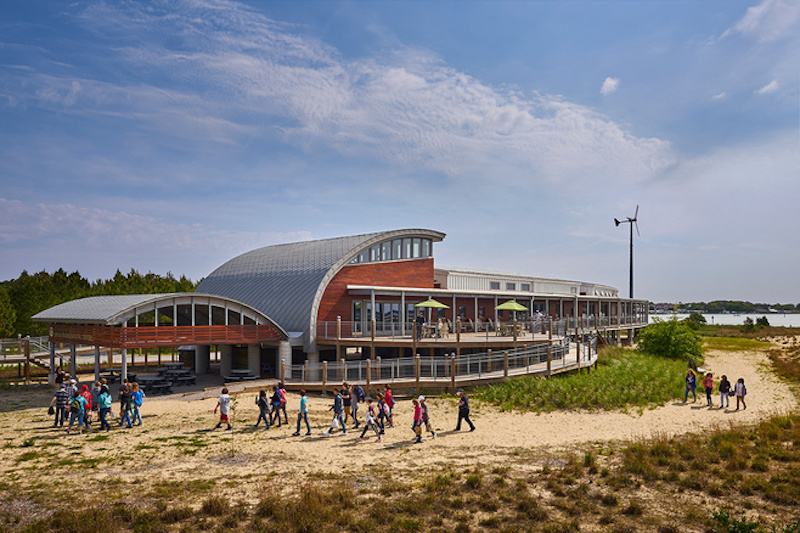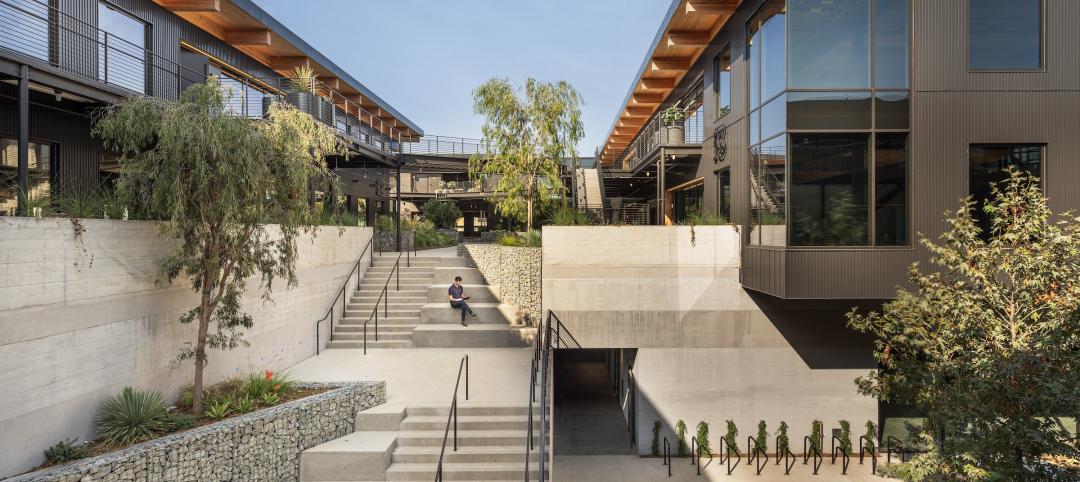The easiest and most cost-effective strategies in sustainable design—daylighting, optimal building orientation, a tight envelope, super-efficient HVAC systems, LED lighting—are taken for granted today. AEC leaders in green building are stepping up to a higher level of innovation.
TOP 130 GREEN BUILDING ARCHITECTURE FIRMS
Rank, Firm, 2015 Revenue
1. Gensler $768,470,000
2. Stantec $331,794,291
3. HOK $280,570,000
4. Perkins+Will $195,460,000
5. Skidmore, Owings & Merrill $175,140,374
6. HKS $163,696,602
7. EYP $137,479,466
8. SmithGroupJJR $122,636,361
9. CallisonRTKL $104,462,061
10. CannonDesign $69,400,000
TOP 90 GREEN BUILDING CONSTRUCTION FIRMS
Rank, Firm, 2015 Revenue
1. Turner Construction Co. $5,701,000,000
2. Clark Group $2,620,000,000
3. Hensel Phelps $2,286,280,000
4. Skanska USA $1,941,400,000
5. Swinerton Inc. $1,918,000,000
6. Gilbane Building Co. $1,746,261,000
7. Whiting-Turner Contracting Co., The $1,600,777,900
8. Suffolk Construction Co. $1,514,705,316
9. Structure Tone $1,460,800,000
10. Holder Construction Co. $1,335,000,000
TOP 60 GREEN BUILDING ENGINEERING FIRMS
Rank, Firm, 2015 Revenue
1. Jacobs $203,161,333
2. AECOM $200,900,000
3. Arup $168,783,060
4. Thornton Tomasetti $67,382,221
5. Syska Hennessy Group $32,420,857
6. Burns & McDonnell $24,341,832
7. Vanderweil Engineers $23,508,800
8. Smith Seckman Reid $20,189,000
9. DeSimone Consulting Engineers $19,799,641
10. Dewberry $19,159,460
GREEN GIANTS SPONSORED BY:
Some have created tools that aid designers’ ability to more precisely compare the projected energy performance of various design concepts, materials, and equipment choices. Designers can kick the tires on an array of options early in the design process.
Occupant wellness and comfort have also gained increasing prominence, especially since the signing of a partnership between the International WELL Building Institute and the U.S. Green Building Council in 2014. “If it doesn’t enhance the wellness of occupants, it’s not really sustainable,” says Mike Szabo, OAA, AIBC, Principal, Diamond Schmitt Architects.
To be a green leader today, you have to dig deeper into data. For Diamond Schmitt, existing energy models only go so far. “We have a diverse portfolio, and we don’t do prescriptive design,” Szabo says. To improve the quality of data for its project types, the firm, in collaboration with the engineering firm RWDI, developed a visual database with energy simulation models. The models take energy-load information from the firm’s portfolio and extrapolate predictive data that is used in the early stages of design.
“There are a series of filters—location, heating, process loads, etc.—so you can drill down beyond a single measure of energy usage per square meter,” Szabo says. “This allows us to ask the right questions about the core issues that make projects perform more efficiently.”
On a recent master-planning project for a mixed-use development, the tool helped the firm and the client choose from among three possible site configurations to find the best orientation for energy efficiency.
ZGF Architects has also found existing databases, such as Energy Star, lacking. The firm specializes in the design of hospitals, laboratories, and research facilities, all of which have higher-than-average energy loads. “The actual performance of these buildings is driven largely by the program,” says Associate Partner Vikram Sami, AIA, BEMP, LEED BD+C.
Using publicly available data from the Department of Energy, ASHRAE, and its own projects, ZGF developed an energy-load database for such project types. The data is stored on Microsoft Excel and maps to Revit. Designers filter the data according to the program of individual spaces—climate, equipment loads, and other factors—to get fairly reliable answers to what-if questions about energy demand and savings. ZGF’s Energy Programming Dashboard helps its designers obtain energy load information on individual pieces of equipment—pumps, heating units, lighting fixtures—which can then be combined to create the optimal aggregation of equipment.
on the wellness front
ZGF has teamed up with researchers at the University of Washington on Lark Spectral Lighting. The tool allows designers to use spectral data to define how the quality of light impacts not only a physical space, but also the occupants. The color and quality of light affect humans’ circadian rhythms, sleeping patterns, and alertness, which can impact employee productivity.
“The spectral content of light sources changes as the light bounces off of surfaces,” says ZGF Associate Ed Clark, LEED AP BD+C. The choice of materials and color schemes for ceilings, walls, floors, and furniture influences the quality of light. Darker colors absorb light; lighter colors are more reflective. The Lark tool (free download at: www.food4rhino.com/project/lark) provides a model that helps designers configure optimal combinations of lights and interior materials.
How architectural features impact wellness is an ever-growing competitive consideration for AEC firms that design and construct new office space. KSS Architects encountered this in its work for Burlington Stores.
The off-price retailer wanted its new headquarters in New Jersey to appeal to Millennials. KSS’s design encourages workers to get out of their chairs and move about the facility during the day. A large café has extensive indirect daylighting, bright colorscapes, and long, European-style tables. The space is busy throughout the workday, not just at mealtimes, notes Ed Klimek, AIA, NCARB, Partner, KSS Architects.
Small nooks outfitted with furniture are spread throughout the building. Outdoor seating is arranged on the north side of the structure. These features are tailored especially for the young professionals accustomed to working untethered from their desks. “The design was a response to an emerging generation of people with new expectations of what a workplace should be,” Klimek says.
Elevators are pushed to the side of a large, sweeping staircase to encourage employees to take the stairs. Spaces that foster physical activity—and add variability to workspaces, seating postures, and scenery—are believed to promote a healthier style of work.
The project included many LEED-blessed approaches, but the owner chose not to apply for certification. “It’s less about getting the plaque and more about how design can have a direct impact on sustainability, wellness, and saving money,” Klimek says. “It’s about looking for unique ways your project can address sustainability, not because they are cool, but because they matter.”
RETURN TO THE GIANTS 300 LANDING PAGE
Related Stories
Sustainability | Sep 18, 2024
3 living buildings made by a living practice
Prompting humans to reexamine our relationship to the environment, architecture creates the opportunity for us to physically experience ideas of beauty, performance, and structure through the distinct lens of place.
3D Printing | Sep 17, 2024
Alquist 3D and Walmart complete one of the nation’s largest free-standing, 3D-printed commercial structures
Walmart has completed one of the largest free-standing, 3D-printed commercial structures in the US. Alquist 3D printed the almost 8,000-sf, 20-foot-high addition to a Walmart store in Athens, Tenn. The expansion, which will be used for online pickup and delivery, is the first time Walmart has applied 3D printing technology at this scale.
Retail Centers | Sep 17, 2024
Thinking outside the big box (store)
For over a decade now, the talk of the mall industry has been largely focused on what developers can do to fill the voids left by a steady number of big box store closures. But what do you do when big box tenants stay put?
Government Buildings | Sep 17, 2024
OSHA’s proposed heat standard published in Federal Register
The Occupational Safety and Health Administration (OSHA) has published a proposed standard addressing heat illness in outdoor and indoor settings in the Federal Register. The proposed rule would require employers to evaluate workplaces and implement controls to mitigate exposure to heat through engineering and administrative controls, training, effective communication, and other measures.
Codes and Standards | Sep 17, 2024
New California building code encourages, but does not mandate heat pumps
New California homes are more likely to have all-electric appliances starting in 2026 after the state’s energy regulators approved new state building standards. The new building code will encourage installation of heat pumps without actually banning gas heating.
Mass Timber | Sep 17, 2024
Marina del Rey mixed-use development is L.A.’s largest mass timber project
An office-retail project in Marina del Rey is Los Angeles’ largest mass timber project to date. Encompassing about 3 acres, the 42XX campus consists of three low-rise buildings that seamlessly connect with exterior walkways and stairways. The development provides 151,000 sf of office space and 1,500 sf of retail space.
Education Facilities | Sep 16, 2024
Hot classrooms, playgrounds spur K-12 school districts to go beyond AC for cooling
With hotter weather occurring during the school year, school districts are turning to cooling strategies to complement air conditioning. Reflective playgrounds and roads, cool roofs and window films, shade structures and conversion of asphalt surfaces to a natural state are all being tried in various regions of the country.
Office Buildings | Sep 16, 2024
Maximizing office square footage through ‘agile planning’
Lauren Elliott, RID, NCIDQ, Director of Interior Design, Design Collaborative, shares tips for a designing with a popular and flexible workspace model: Agile planning.
3D Printing | Sep 13, 2024
Swiss researchers develop robotic additive manufacturing method that uses earth-based materials—and not cement
Researchers at ETH Zurich, a university in Switzerland, have developed a new robotic additive manufacturing method to help make the construction industry more sustainable. Unlike concrete 3D printing, the process does not require cement.
Libraries | Sep 12, 2024
How space supports programming changes at university libraries
GBBN Associate Sarah Kusuma Rubritz, AIA, uses the University of Pittsburgh's Hillman Library to showcase how libraries are transforming to support students’ needs.


















